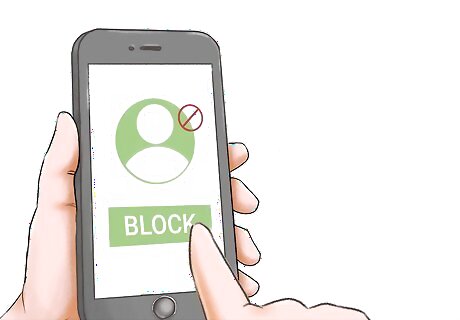
views
Finding Ways Within Yourself

Ignore the ignorant person. If an ignorant person is bothering you, you can choose to disregard them. This is especially true if the person is simply trying to make you angry or start an argument. You can simply not respond, or, if you are with a group of people, turn your attention to someone else. If that doesn't work, turn around and tell them to leave you alone.

Walk away. Sometimes just physically separating yourself from an ignorant person is enough to stop him or her from bothering you. Furthermore, if you walk away when a person says something ignorant, you are sending the person a clear message that you think his or her point of view is unacceptable. Even if you are dealing with ignorant people online or on social media, you can choose to ignore their comments. In many cases, you can block users or hide their comments/posts if you find them bothersome.

Distract yourself. If someone’s ignorance is bothering you and you can’t get away from him or her, you can distract yourself by turning attention to work, a hobby, or entertainment. Distracting yourself can also work if you find yourself still thinking about someone’s ignorant comment long after it has been said.

Keep family situations peaceful. Given the close relations, you may not be able to simply disregard or walk away from family members who say ignorant things. Focus on being as polite and sensitive as you can, and try to diffuse any volatile situations. You can try: Changing the subject. You can simply shift the conversation away from topics where a family member shows ignorance. You can also tell an ignorant family member that you want to avoid conflict and move on: “I don’t want to argue, so let’s change the subject and talk about something else.” Creating a diversion. Suggest playing a favorite game, watching television, or some other distraction to change the mood and topic. Resorting to humor. Laughter can diffuse tension and shift attention, so telling a good joke or funny story is a good way to keep the peace and overlook a family member’s ignorance. Commiserating with other family members. If other family members are bothered by someone’s ignorance, you can vent to each other. Just make sure to focus on the ignorant comments, and not on criticizing or attacking the family member.

Stay professional at work. If you are dealing with someone’s ignorance while at work, staying busy and focused on your tasks will keep you from dwelling on it, becoming angered, and not doing your job well. You can try using work as an excuse to escape someone’s ignorant comments. If a coworker is saying ignorant things in a conversation and you want to get away, tell them something like: “Wow, I’ve got a lot of work to do. I better get back to it.” Giving signals that you don’t want to be disturbed can stop coworkers from pestering you with ignorant comments for the first place. For instance, if you are able to wear headphones while working, this might deter people from interrupting you. Meditation, breathing exercises, or even taking a short break can calm you and help keep coworkers’ ignorant comments from bothering you. Try to take a couple of minutes once or twice during the workday to get away and clear your mind using one of these methods. Find a work friend you can vent to about a coworker’s ignorance. Just make sure to focus on the ignorant comments, and not on criticizing or attacking the coworker. Avoid open confrontation at work. Arguing with your coworkers over their ignorant comments will not only make you angry, it makes you seem less professional and could even cost you your job if the situation escalates.

See things from the other person’s perspective. Consider what might have led the person that is bothering you to think the way that he or she does, and try to understand. Think about this person’s background, and how it might have contributed to their views. Ask yourself: “How would I feel if I were this person, or in this situation?”

Practice empathy. Remind yourself that everyone has flaws, and that no two people see things in exactly the same way. Likewise, remember that no one knows everything, and that you are surely ignorant about some things, too. With these thoughts in mind, you can try to forgive or overlook someone else’s ignorance. Think about a time when you said something ignorant. How did others react? How would you have wanted them to react? Think about how you can acknowledge, understand, and share the feelings of the person that is bothering you. Choose your words carefully when speaking to him or her. Use a non-accusatory tone of voice and say things like “Let me see if I have this right….” or “It sounds like you’re saying….”

Rise above. It is often said that you can’t change other people, only yourself. Keep in mind that an ignorant person may simply refuse to change their views or try to understand yours. Instead of making yourself angry and stressed about trying to change what you can’t, focus on modeling virtues that you might value, like open-mindedness, tolerance, and self-control. There are two issues in conflicts of communication: objective (factual) differences, and emotional issues that are attached to them. You might not be able to change people’s erroneous view of the facts, but you can change how you feel about their ignorance.
Communicating with Ignorant People

Be kind. If you have to or want to communicate with ignorant people, try modeling the behavior you’d like to see from them—even if they’re not showing it. Show sympathy and patience when listening to them, even if you strongly disagree. Eventually, your modeling might rub off on them. Try saying things like: ”This is a really complicated issue. I can see that you think X. I see things differently, because of Y and Z” ”There are a lot of facts to consider in this situation. Maybe we all need to do some more research before making a judgment.”

React with compassionate silence. If a person says something ignorant, it might be your instinct to react by telling the person that he or she is wrong. Never underestimate the power of silence, however. If you respond to this person by saying nothing at all, and only staring at them blankly, you are sending a powerful, silent message that his or her ignorant comment is so far off the mark that it’s not even worth a response. If the person doesn't simply accept your silence, say something like "I feel like I need a little bit of a conversation break, but I want to continue to be around and be together and just enjoy our space, but I just would like to be able to just enjoy some quietude together.

Offer references. Remember that it is very common for people to jump to conclusions and that we often aren’t aware of our own ignorance. If you are dealing with people who display ignorance by refusing to believe the facts or stating false information, offer references to the right information rather than just telling them that they are wrong. Try saying something like “I hear you when you say that X is true, but if you read Y it actually states that Z is true.” If you can’t remember the details, or just want to be extra-diplomatic when pointing out someone’s ignorance, try saying something like “I’m not an expert on the subject of X, but I think that if you read Y it says Z.”

Offer a compromise. If you can’t seem to communicate convincingly with an ignorant person, politely state that you don’t agree with him or her. Put yourself in the other person’s shoes, hard as it may be, and try to reach a compromise: Offer to talk more about the issue later, after you’ve both had time to think. Try saying something like "I have to ask you if you'd be willing to leave that topic on the shelf, at least for a week, so that we could just have a little space from it, would that be okay?" Suggest that since you don’t agree with each other, it might be best to respectfully acknowledge the difference of opinion and move on (otherwise known as “agreeing to disagree”). If the person says yes, and then has a few mistakes, where they bring it up, try to be compassionate and humorous when reminding them of your agreement.

Know when to stop. You can’t win every battle. If someone’s ignorance is insurmountable, sometimes it's best to just let it be. If you can’t change the way the person thinks, you can at least preserve your emotional well being by letting it go and moving on.

Seek support if you are bullied or harassed. Bullying can happen anywhere, to anyone, and at any age. Often, harassment and/or bullying happens because of ignorance and can take the form of ignorant comments based on race, sex, gender, political or social beliefs. You do not have to accept this. Bullying based on ignorance can show up as rude or lewd jokes, inappropriate comments concerning gender/race/age/etc., sharing of not-safe-for-work materials, demeaning comments, unequal work distribution, and so on. If you are the victim of bullying, try to document it. For instance, save screenshots of comments on social media, save emails, and try to find witnesses. If you are bullied at work, ask for a face-to-face meeting with your bully’s superior to discuss. Bring any documentation you have. You can also speak to your human resources department (or equivalent) about the bullying/harassment. If you are being bullied at school, let your school counselor, parents, or another trusted authority know about it so that you can get help. Schools should have anti-bullying policies. Be persistent if you are not believed. Be sure to pay attention to the anger and to welcome the awareness of it when it's at lower levels. People who don't want to actually learn how to deal with anger, end up getting bitter and resentful, and it actually breeds anger.


















Comments
0 comment